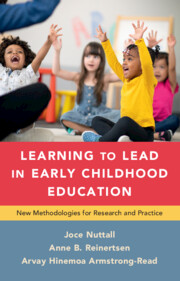Book contents
- Learning to Lead in Early Childhood Education
- Learning to Lead in Early Childhood Education
- Copyright page
- Contents
- Figures
- Acknowledgments
- Chapter 1 The Impetus for This Book: Our Early Childhood Leadership Think Tank
- Chapter 2 Nau mai e Hine ki te Aoturoa a tou tupuna a Tanematuai tiki ai ki roto o Matangireia i a Io Matangaro, i roto o Rangiātea a whata ana
- Chapter 3 Te Kete Aronui
- Chapter 4 Leadership as Change
- Chapter 5 Knowledge Possibilizing
- Chapter 6 A Cultural-Historical Activity Theory Perspective on Learning to Lead
- Chapter 7 Leading Organizational Change: The Case of Haneul Early Learning Center
- Chapter 8 A Conversation between Approaches
- References
- Index
Chapter 3 - Te Kete Aronui
Colonization, Racism, and White Privilege in the Lives of Māori Women Leading in Mainstream Early Childhood Centers in Aotearoa New Zealand
Published online by Cambridge University Press: 17 August 2023
- Learning to Lead in Early Childhood Education
- Learning to Lead in Early Childhood Education
- Copyright page
- Contents
- Figures
- Acknowledgments
- Chapter 1 The Impetus for This Book: Our Early Childhood Leadership Think Tank
- Chapter 2 Nau mai e Hine ki te Aoturoa a tou tupuna a Tanematuai tiki ai ki roto o Matangireia i a Io Matangaro, i roto o Rangiātea a whata ana
- Chapter 3 Te Kete Aronui
- Chapter 4 Leadership as Change
- Chapter 5 Knowledge Possibilizing
- Chapter 6 A Cultural-Historical Activity Theory Perspective on Learning to Lead
- Chapter 7 Leading Organizational Change: The Case of Haneul Early Learning Center
- Chapter 8 A Conversation between Approaches
- References
- Index
Summary
This chapter presents a case study of kaupapa Māori theory applied to the leadership perspectives of ten Māori women leading “mainstream” (i.e., non- Māori) early childhood education services in Aotearoa New Zealand. The chapter recounts how, as the research progressed, it became increasingly clear that the perspectives of the participants had been, and continued to be, shaped by continuing traces of the colonial history of Aotearoa New Zealand. The chapter portrays the participants’ acute awareness of a variety of mechanisms of racism and white privilege, including self-silencing, appropriation of cultural knowledge, and, for some, shame at not being able to speak the Māori language. These mechanisms of erasure are traced back to key initiatives and legislation in the country’s colonial history. The later part of the chapter recounts how the participants were able to draw on their cultural knowledge as a source of strength and to to exert resistance to ongoing oppression. The chapter ends with a call for the early childhood field to recognize and respond to the ongoing harmful effects of colonization for Māori.
- Type
- Chapter
- Information
- Learning to Lead in Early Childhood EducationNew Methodologies for Research and Practice, pp. 34 - 52Publisher: Cambridge University PressPrint publication year: 2023

